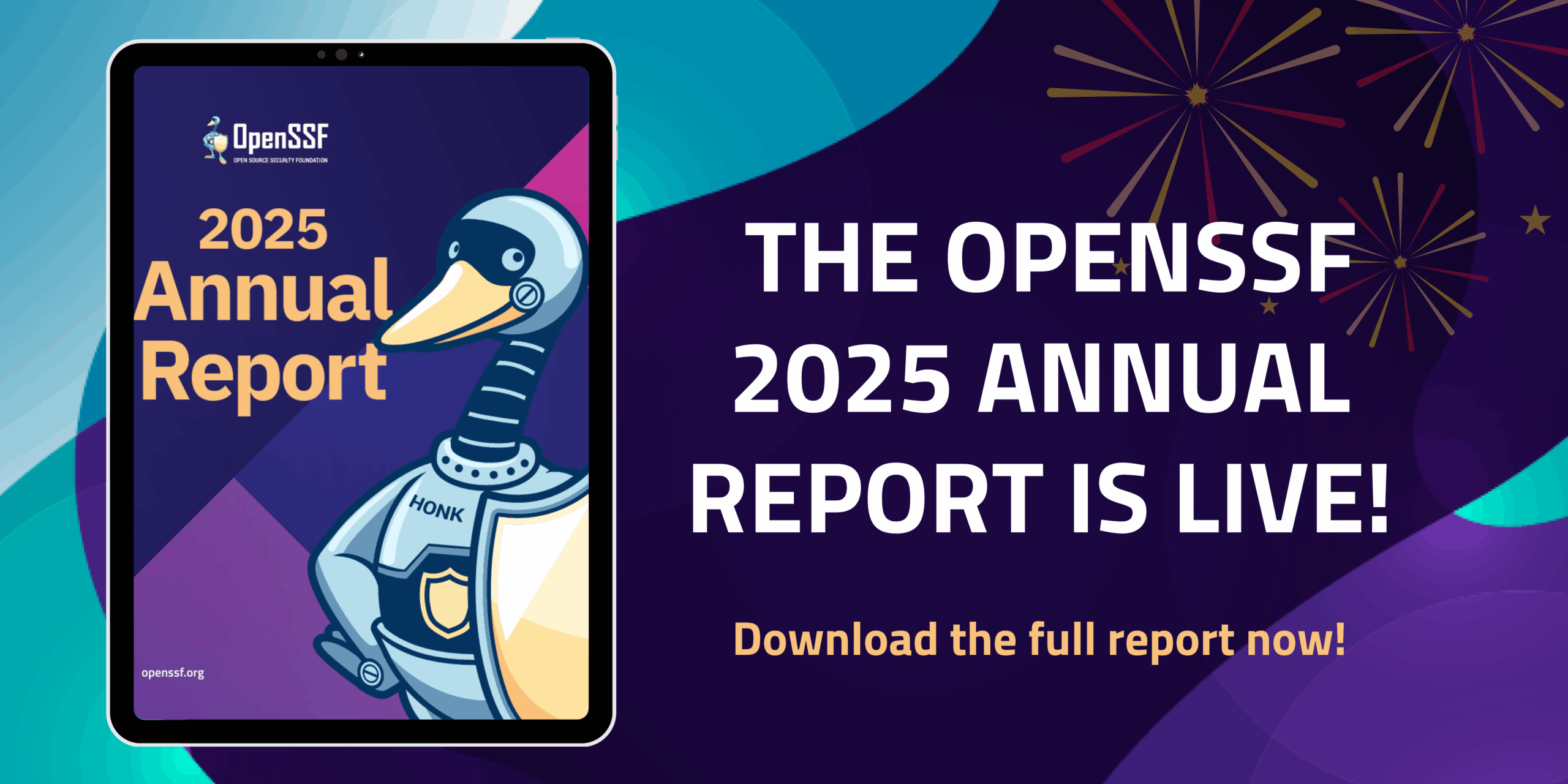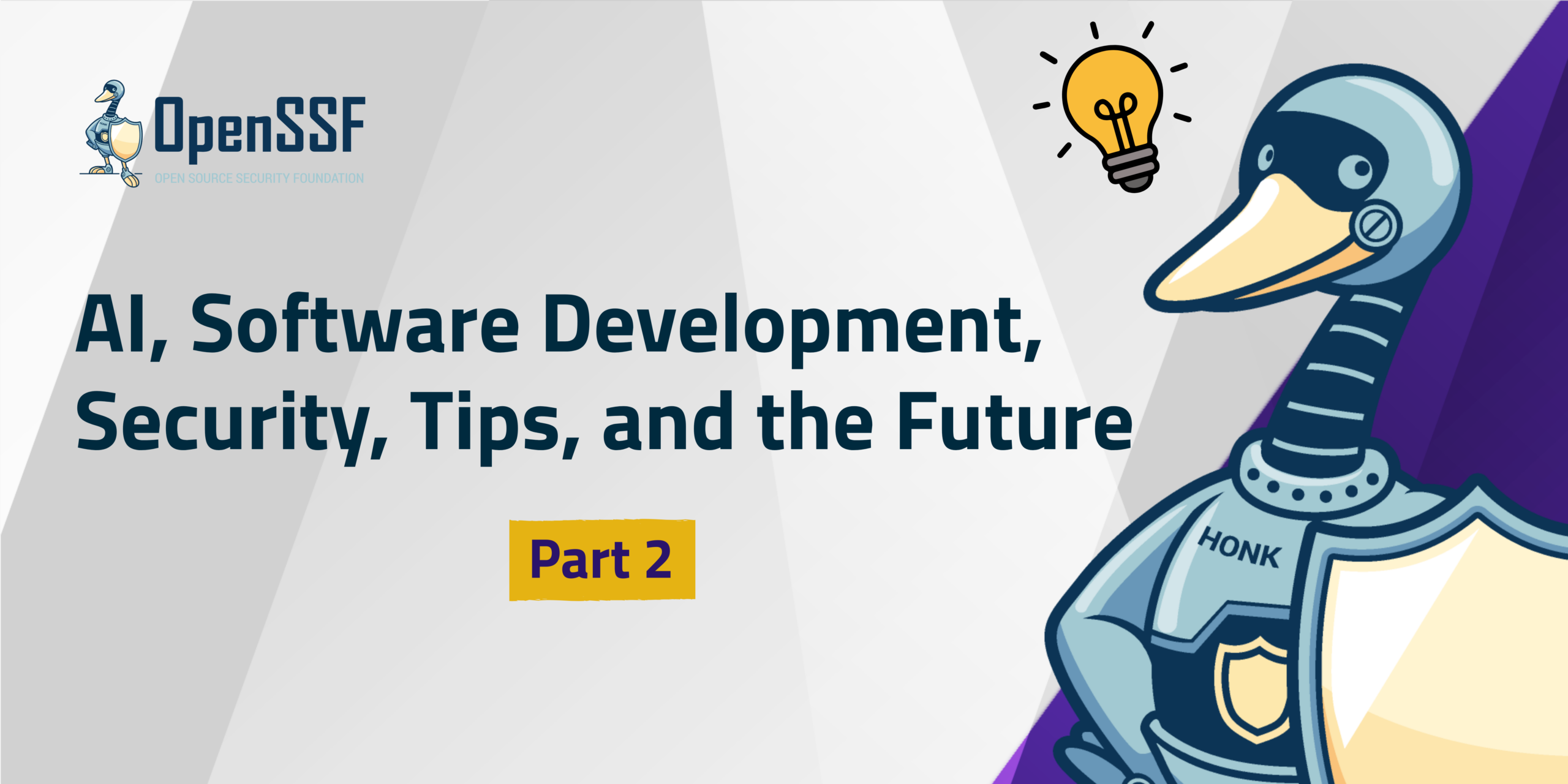


Join co-hosts CRob and Yesenia for a special season finale celebrating OpenSSF’s fifth anniversary and recapping an incredible year of innovation in open source security! From launching three free educational courses on the EU Cyber Resilience Act, AI/ML security, and security for software development managers, to the groundbreaking DARPA AI Cyber Challenge where competitors achieved over 90% accuracy in autonomous vulnerability discovery, 2025 has been transformative. We reflect on standout interviews with new OpenSSF leaders Steve Fernandez and Stacey, deep dives into game-changing projects like the Open Source Project Security Baseline and AI model signing, and the vibrant community conversations around SBOM, supply chain security, and developer education. With nearly 12,000 total podcast downloads and exciting Season 3 plans including AI Cyber Challenge competitor interviews, CFP writing workshops, and expanded global community initiatives in Africa, we’re just getting started. Tune in for behind-the-scenes insights, friendly competition stats on our most popular episodes, and a sneak peek at what’s coming in 2026!
00:00 – Celebrating OpenSSF’s Fifth Anniversary
02:52 – Educational Growth and New Initiatives
05:51 – Community Voices and Leadership Changes
08:45 – The Role of Community Manager
11:44 – Open Source Project Security Baseline
14:47 – AI and Machine Learning in Open Source
17:47 – Software Bill of Materials (SBOM) Discussions
20:34 – Podcast Highlights and Listener Engagement
22:26 – Looking Ahead to Season Three
CRob (00:05.428)
Welcome, welcome, welcome to What’s in the SOSS. Today I’m joined with my co-host, Yesi, and we got a really great recap for everybody. We’re gonna be talking about the whole last year’s season of What’s in the SOSS, some of the amazing people that she and I got to interview. Yesi, I’m excited to actually get to talk with you today.
Yesenia (00:13.58)
Hello.
Yesenia (00:30.318)
I know, I got co-host and I never got to co-host with you and here we go. But today’s exciting because it’s not just celebrating everyone’s impact and everything awesome that’s been done in the open source community, but this year’s actually OpenSSF’s fifth year anniversary. That was amazing. I just found out. I was like, whoa, good episode.
CRob (00:47.44)
Wait!
CRob (00:53.646)
Yeah, some of us have been around a whole five years, so it’s not quite a surprise, but hey. That’s right. So I mean, kind of looking back over the last year, we had so many amazing things that both our community did and then like we’ve highlighted through the podcast. You know, let’s you know, we had a whole section where we worked with our.
Yesenia (00:58.798)
But at least we’ve made it longer than COVID. That’s fine.
CRob (01:18.704)
Linux Foundation education team on a whole cybersecurity skills framework to try to help coach new people into the profession and try to help identify skills that employers would want to hire. And I know this has been talked about a little bit in the bear working group, right?
Yesenia (01:36.598)
Yes, it’s something that we’re also using to consider as we bring in more contributors that are newer to this space. This is like a really good framework and a functional structure of how we can bring in these folks and help them scale up as well as helping these open source contributors.
CRob (01:53.368)
Right, and as we’re upskilling, you know, the crew and the back was really busy. We issued three whole new courses this year. All three exactly.
Yesenia (02:02.318)
Free courses and across the different very important spaces because who isn’t talking about CRA and AI? right there. Like it’s right there for you. got an hour long video on each. You got a nice little badge at the end. And for our software development managers, we can also talk about security. So those are, you know, three new courses if you’re checking out on how to expand your education.
You have the LFD 125, which is your security for software development managers. Two on my bucket list because they impact my work, which is understanding the EU Cyber Resilience Act. That’s LFEL 1001. wonder, my binary math is a little rustic, but curious what that converts to. And then our secure AI ML driven development. This one, I know a few people in the…
The BEAR working group that I’ve taken it and good feedback and BEARRRR!. But not even these new courses, but just the group in general. We have new LFS, new OpenSSF members joining us.
CRob (03:14.96)
That was pretty cool. And I think you actually got the opportunity to interview Stacey when she started, right? She’s our new Community Manager.
Yesenia (03:23.456)
Yeah, if you haven’t worked with the open-ended stuff, you haven’t met Stacey’s great community manager, really there. I wanted to say a word, but we’re on live, so I can’t. But she’s really driving. It’s good episode too. She got on our podcast, shared a little bit of her background. And I know she works closely with the Bear community, helping drive a lot of the operations. But we also had a new general manager. You got to interview.
CRob (03:51.384)
Right, yeah. Yeah, my new boss Steve, Steve Fernandez joined us around the first quarter and he brings with us a real kind of business and corporation focused background. So he’s really helped kind of mature a lot of the stuff we do around here and enhanced the scope of the services that we offer the community.
Yesenia (04:13.006)
And there was one more. I don’t know, I can’t put my finger on it. There was one more new member. Hmm.
CRob (04:16.75)
Hmm
Well, we did have a new co-host this year. Hello?
Yesenia (04:22.306)
That’s right, it’s me! Yes! Sound more now!
CRob (04:28.747)
Very exciting. Yeah. And overall, the podcast kind of focused on current topics, new and interesting projects like our security baseline. We had a couple talks around CRA and I know that we are, we’ll kind of save this a little bit as a teaser for next year, but we did several talks talking about AI.
Yesenia (04:49.902)
And there we did also talk on the AIxCC, which, you know, they’re going ahead and pushing security into the future with their autonomous vulnerability discovery. I know working in my past that that autonomous vulnerability discovery is such a complex, huge issue that I’m excited somebody’s driving deeper into that and working with OpenSSF.
CRob (05:12.752)
And I think I mentioned to you in some of the podcasts, I came into the whole AIxCC competition incredibly skeptical that I was unsure of the value that AI tools would bring into this space. But after we got the results, I was just floored. The fact that like the top team had over a 90% accuracy rate in finding and writing a fix for vulnerabilities.
Yesenia (05:39.078)
Wow.
CRob (05:41.836)
The second place team was only in the high 80% success ratio…only. Yeah, like there’s some amazing stuff and that really kind of convinced me that this is there’s some value in this space. And I think there’s, I’m really looking forward to some of the collaboration with around the cyber reasoning systems and a lot of the new things we’re doing in the AI space right now.
Yesenia (05:59.663)
Do know if they’re continuing it for next year?
CRob (06:06.116)
The competition isn’t continuing, but we will be continuing to work with DARPA and ARPA-H and the different competitors. We’ve already lined up. You’ll see some podcasts coming out in the early next year where we’re talking to the different competition teams. And several of those groups already are working to donate their software to the OpenSSF to help continue to grow a community and continue the development and refinement of these systems. There’s going to be some amazing stuff out of the AIML Working Group next year.
Yesenia (06:24.087)
Nice.
Yesenia (06:34.68)
Yeah, because I can just imagine with the percentage of the intrigue, just the research and the technical architecture of how they designed this to be able to produce such results. I know it’s going to be a huge impact into our open source and the security overall. But it’s for one year, you know, we had educational growth, governance, maturity, policy collaboration, our supply chain security. That’s one of my favorite words. I got earrings for it. It’s sharper.
CRob (06:51.631)
Yeah.
Yesenia (07:04.864)
And then you got AI, know, the preflow of that that’s come in. It’s really hit the open source in a real way. And I’m excited and I love that the podcast is capturing how we’re evolving in these spaces with the voices from our community.
CRob (07:19.172)
Mm-hmm. So let’s talk about those community voices a little bit. You mentioned that I had the opportunity to kind of talk with Steve, our new General Manager, and it was interesting that, know, Steve spent some time in his podcast, which was the title was Enterprise to Open Source, kind of talking about Steve’s journey. And he really kind of focused in on how his decades ofbeing a consumer of open source really is forming his current role as a steward of open source right now.
Yesenia (07:56.931)
Yeah, after listening to that, it was, it was, it’s understanding of why he got the position considering his background in the space, like, and just since he started the changes that’s happened in open source and the growth of what is, you know, Steve’s vision from where he bridges enterprises’ risks mindset with that of open source. Like that is something we definitely need to consider when it comes to it, because one of their major consumers is our enterprises.
And I know he’s played a big role in the Baseline and maturing that foundation of it. From listening to the episode, I know he talks about like those decades of consuming and then stepping into this and really calling security a hidden greatness, which is the work that you only notice when it’s missing or you get impacted, right? And this is for even the everyday person is like, you won’t realize that you need that security privacy until youknow, credit cards are stolen, right? So, but for him really coming in and turning those enterprise pain points into what is OpenSSF roadmap this year, and the greater is really helping organizations ship safer software.
CRob (09:09.88)
I agree. Now let’s talk about showing up fully. This was the interview you did with Stacey, our new Community Manager. What highlights would you like to share out of that conversation?
Yesenia (09:19.874)
This one, I love this, this is one of my favorites. Stacey came in and she’s had this background of becoming a community manager for open source communities. And she really kicked the ground running and was pushing that train. Like she’s behind that train moving it. But her real focus was around belonging, that authenticity, the inclusion and connecting BEAR with DevRel. And even though they’re two different working groups under us.
We have a very similar mission, just a different scope. So being able to come in as a community member and really ground how much community work is underpinned and all the technical work. I’ve seen her show up fully to the calls to not just Bear, but the other working groups and just making sure that she drives that community first mindset. And she connects with the maintainers, the members, the newcomers, and just making sure everyone’s being heard and felt. So,absolutely love that and you know there’s so much more into that
CRob (10:24.24)
She also does a pretty amazing keynote.
CRob (10:29.968)
You’ve got to watch the video. It’s amazing.
Yesenia (10:45.43)
and I didn’t get to see the keynote but I you gotta watch it I’ve heard so many with her and Puerco
CRob (10:53.368)
And that’s, I think another interesting thing kind of pivoting around the community manager role. We have so many things going on across all the technical initiatives and working groups. It’s hard to kind of keep track of all of it. And that’s why having this role of that community manager is so important to be that connective tissue between our folks in the community that are contributing with staff, with the Board and the TAC. So it’s really important to have that, that role to help keep us balanced and focused.
Yesenia (11:22.306)
Yes. And let’s not forget, the podcast wouldn’t be the podcast without Stacey sitting here, listening to us, editing, publishing it. Big kudos if you ever see Stacey and you do her podcast. Please let her know she’s working really hard behind the scenes. She’s listening to us right now. So tons of kudos to her.
CRob (11:39.352)
Absolutely. Well, thinking about, thinking about what came up next is, the Open Source Project Security Baseline was a big effort for us, both in our community and within the whole broader LF. We did a, yeah, yeah. And we did a great podcast with two of the maintainers, Eddie Knight and Ben Cotton. And the title was a Deep Dive into the Open Source Project Security Baseline. And, you know, I thought that was.
Yesenia (11:53.932)
You helped push a lot of that.
CRob (12:08.752)
Pretty amazing little chat because both Eddie and Ben approached this project from the perspective of an upstream maintainer. We want to do whatever we can to remove work and burden from upstream and allow them to focus on creating amazing software and not necessarily have them have to worry about a compliance checklist, so to speak.
Yesenia (12:33.998)
And what I know with the Baseline, it ties together several projects.
CRob (12:39.596)
Yeah, have the Baseline itself is the catalog, which is the brains of the whole operation. And that details a list of requirements that should be done in the course of software development, publication and consumption. And then we have the orbit working group, which actually is the kind of the home for the baseline. And the ORBIT working group has a series of software projects.
That help try to automate or enable a lot of these different techniques. So we have things like around managing, making policy-based decisions in your CI pipeline, like a minder or a Gemara. We have a security insight spec that’s all part of the Orbit Working Group. And that’s a way for people to express how they are achieving some of these requirements. So like, for example, if you’re a project and you make, you issue SBOMS.,
You can make a security insights file to tell people how to find your SBOM. So they don’t have to come continually emailing you asking you for more information.
Yesenia (13:47.119)
And I heard a very quotable famous quote come out of this podcast, which was, oh, we got to put this on a t-shirt. “Give maintainers a way to show their security work, not just promise it.” Because that’s a huge thing. You’re working on these projects day and night in the stereotypical basement. And no one really cares unless they’re impacted, not in that sense. But it’s nice that we could show.
Have a way for maintainers to show their security work, give themselves a kudos and acknowledgement for the hard work putting it together.
CRob (14:19.279)
Right.
CRob (14:23.21)
And that’s where I’m very excited. And this kind of ties in with Steve’s vision and strategy is that projects like Baseline or SLSA, these are things that help downstream, meet your boardroom expectations. But all of these things are created and curated by the community. So again, we try to wherever possible focus in on the maintainer experience and making things easier. And I just love thatkind of dual purpose that we’re trying to help both up and downstream at the same time.
Yesenia (14:56.824)
Yeah. And then this year we also going back into those educational pieces, like some other episodes we talked to it was, you know, David Wheeler’s new AI ML Development Software. We have the Cybersecurity Skills Framework that we talked about earlier. And from there, we had that conversation with Sarah. think you interviewed Sarah on the AI competition model signing. What was your takeaway from that?
CRob (15:25.168)
Yeah, that was really great. So that was right as, so we have an AI ML Working Group is one of our technical initiatives and they’ve been around for about three years. And it was a little bit of a slow start where they did a lot of talking and evaluating and kind of setting up liaison relationships with the, there’s a whole cast of characters that are involved in AI security in the upstream ecosystem. And when I talked with Sarah, it was right after they’d had two publications.
The first was an AI Model Signing Project where they were leveraging a Sigstore and In-toto to help consumers understand, here is a signed model or a signed artifact. On this day, theycreated this artifact and it’s been untampered with since. So again, it’s trying to help provide more information into the pipeline so people can make risk-based decisions.
Yesenia (16:02.837)
interesting.
CRob (16:21.774)
And then right after that, they also released a white paper and of talking about how to integrate DevSecOps practices into machine learning and LLM development. And that’s been a really important artifact where it’s helped us realize, recognize that there are a lot of people involved in creating air quotes here, AI stuff, whether it’s an application, you’re training a model, you’re trying to go to market with something. There’s a lot of personas that are involved and onmost of them aren’t classically trained software engineers or cybersecurity practitioners. So the white paper kind of highlights these other people that participate in this creation process and talks about some techniques that are both old, you know, from AppSec, what we’ve done for 25, 30 years that have worked well, that could be applicable in the AI space. But then they also talk about some new ideas because these technologies are a little different and it does requiresome new ways of thinking, of being able to interrogate the different gizmos, whether it’s GPUs or eGenTech. So each technique requires some a little bit different tools to help protect them.
Yesenia (17:33.487)
Yeah, I’m glad you brought up the white paper because I was about to be like, I read the white paper. It was actually a good piece of knowledgeable guidance and information on how to Model Sign that I’m bringing into my own industry. It’s a good read, you know, and then we have other reads like the CRA compliance that we had a conversation with Alpha-Omega and the Erlang group. Those are also two good episodes to watch or to listen to.
Yesenia (18:03.522)
When it comes to the CRA. But, you we’ve talked about Baseline, we talked about GUAC, we’ve talked about SLSA, but the other card on, you know, the other bingo card for 2025 is SBOM. What episodes do we have on that?
CRob (18:14.746)
That’s right.
What episodes did we have on software bill of materials?
CRob (18:51.608)
Right, we did do several things around SBOM. We had the opportunity to talk with Kate Stewart, who’s been a leader within the software build material space almost since the beginning. She represents SPDX, which is one of the two tools that most people use to create software builds materials, with the other one being Cyclone TX that our friends over at OWASP care take. And that was really interesting kind of talking about Kate’s perspective of the evolution of these things.
And then more recently, I had the opportunity to talk with the chief security officer of Canonical, my former coworker, Stephanie Domas. And we talked about a bunch of different things. And SBOM was kind of wrapped up in that conversation and talking about just challenges within the current regulated space that both commercial entities like an.
Yesenia (19:26.445)
Ooh.
CRob (19:41.546)
Canonical will face, but also upstream open source maintainers as well. So really engaging conversations around supply chain and software bill materials. The GUAC conversation was also really good and kind of important. That’s a very useful tool to help you get wisdom out of your SBOMS. Wisdom.
Yesenia (20:00.601)
Wisdom. Word of the day. It’s awesome. Considering it’s OpenSSF’s fifth year, just this year’s reflection on podcasts, we’ve really covered on multiple areas of the community, has been working on. And just my favorite thing about this whole thing is the little competition that’s going on against these podcast episodes where our guests have come in and asked, what’s my number? What’s my view? So as of today’s recording, we have the Mike Lieberman’s talk on GUAC SLSA and securing open source at 611. GitHub’s Mike Hanley, transforming department of NO . at 406.
Yesenia (20:55.886)
Eric Brewer and the future of open source software at 370, Vincent Danen and the Art of Vulnerability Management at 328. I’m so glad my dislexia, is not switching these numbers. And lastly, we have Sonatype’s Brian Fox and the Perplexing Phenomenon of Downloading Known Vulnerabilities at 327. So if you want to help these folks out,
Yesenia (21:25.644)
Give it a listen and let’s see if we can change the top episodes by the end of the year.
CRob (21:31.024)
It’s kind of a curious peek behind the scenes where guests will come in and do their podcast. And they’re very interested. It’s not vanity, but people like to hear that their work is valued. And so there is very healthy competition and some little bragging rights that Mr. Lieberman will kind of say, well, I have the most downloaded open as a podcast. So it’s just kind of fun, like a friendly little healthy competition. And again, and focusing in on some of these key areas of supply chain security, application development, software build materials and such.
Yesenia (22:06.19)
Yeah, it’s crazy to see that we’ve, across all the episodes, been about 11,800 total downloads and just 6,000 in 2025. So big thank you to our listeners, our supporters for that. I think it’s the first year of this podcast or second.
CRob (22:24.526)
Second, the second. And that actually kind of gives us our segue towards the end here. We’re talking about a lot of things that happened during 2025. And we are about to publish our annual report where you can kind of dive in and double click on some of these details. We’ll provide a link as this podcast is published that you can look at the report that will link into things like our five-year anniversary or our work with DARPA on AICC or all these amazing things around the baseline. So that’s, I’m really excited to kind of share that annual report with everybody that touches on a lot of the topics that Yacenya and I have talked through and many others. And that kind of moves us on. We’re going on to bigger and better things. 2026 is going to be season three.
CRob (23:17.88)
And I think we’ve got some really interesting topics kind of queued up.
Yesenia (23:21.464)
Are we gonna share? Are we gonna share? Are we gonna be nice to our listeners?
CRob (23:24.944)
I think everyone’s on the nice list. We can share that with them. Yeah, you’re going to see us starting off the year with kind of a full court press around AIxCC and AI and ML security topics. We have a bunch of work queued up with some of the cyber reasoning system competitors. We’ll talk with some of the competition organizers, again, talking more with our community experts around these very important topics and maybe unveiling some new projects that our AI team has in the hopper. That’s going to be very exciting. We’re going to have some very special guests from around the world of open source and public policy and research. And we’re going to have some very recognizable names that may have been in the show or a part of our community’s orbit we would love to reengage with and talk more with.
CRob (24:21.358)
So thinking about, you’re going to see multiple series of episodes around the AIxCC competition in particular. We’re going to be focusing in on industry and research stars. So we’re going to try to find some well-known voices out in the research community, joining some of our maintainers and kind of talking about some big picture conversations in the ecosystem. And then you’ll see many more things around our education efforts.
Would you like to talk about some of the stuff I know that Bear’s preparing to do?
Yesenia (24:51.822)
For Bear, we have very exciting things for next year. Not associated with that sports team. We have the next mentorship for the summer that we’re going to be producing. We’re working towards those details. We’re working with a group out in Africa for having an open source, what is it called? Open Source Security and Software Africa Group for the primary focus on doing speaking engagements, holding meetups and conferences in Africa. Cause there’s a huge community group there that have nowhere really to go. with global restrictions and visas, they’re very limited. So helping them kind of grow that out, share out some tips and tricks that we’ll be sharing on social just to drive more awareness into these projects and to these teams. And of course our community office hours, which have also had a lovely set of community members that have come in and shared their journeys, education pieces and blogs that have been recently produced like, Sal and Ejiro have produced about newcomers into the open source. We’re working on getting part three released, but you can find part one and two out in OpenSSF’s blog main page.
CRob (26:39.576)
Excellent. And I’m also excited that we’re going to be doing some special education segments on the podcast around how to write a good call for papers abstract. And then how to build your first conference talk, which is something that again, a lot of these newcomers haven’t had experience with that. Some of us that have been around the block a little bit can help share some of the wisdom we’ve earned over the last couple of Right.
Yesenia (26:46.83)
Yes.
Yesenia (27:02.358)
My try on era.
CRob (27:07.512)
And with that, I want to thank you for coming on board and being our co-host. You’ve really brought in a nice set of energy and a fresh perspective when you’re talking with our community members. And I wanted to remind everybody, as we are preparing for season three, if you have ideas or suggestions for topics, please email marketing at openssf.org. We would love to hear your episode pitches, your CFP stories, if you want to do some demos or have case studies.
Yesenia (27:12.119)
Absolutely.
CRob (27:35.822)
Or you just have just general projects that help the broader OpenSSF mission of improving the security of open source software for everybody forward. So thank you again, Yesenia. It’s been a pleasure. I’m looking forward to another exciting year of talking with you again. All right. Happy open sourcing, everybody.
Yesenia (27:50.776)
Thanks, CRob. To the next episode.
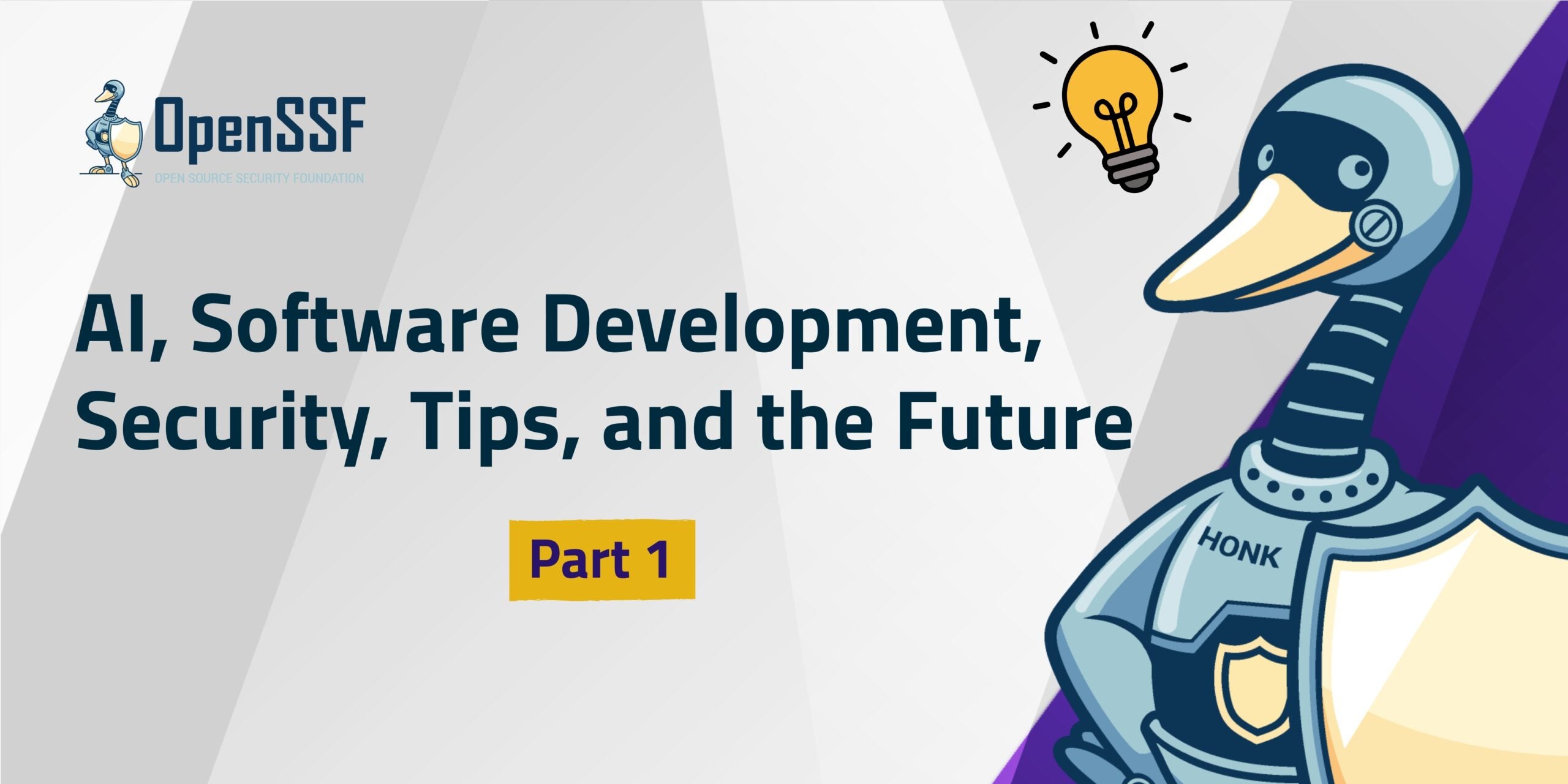
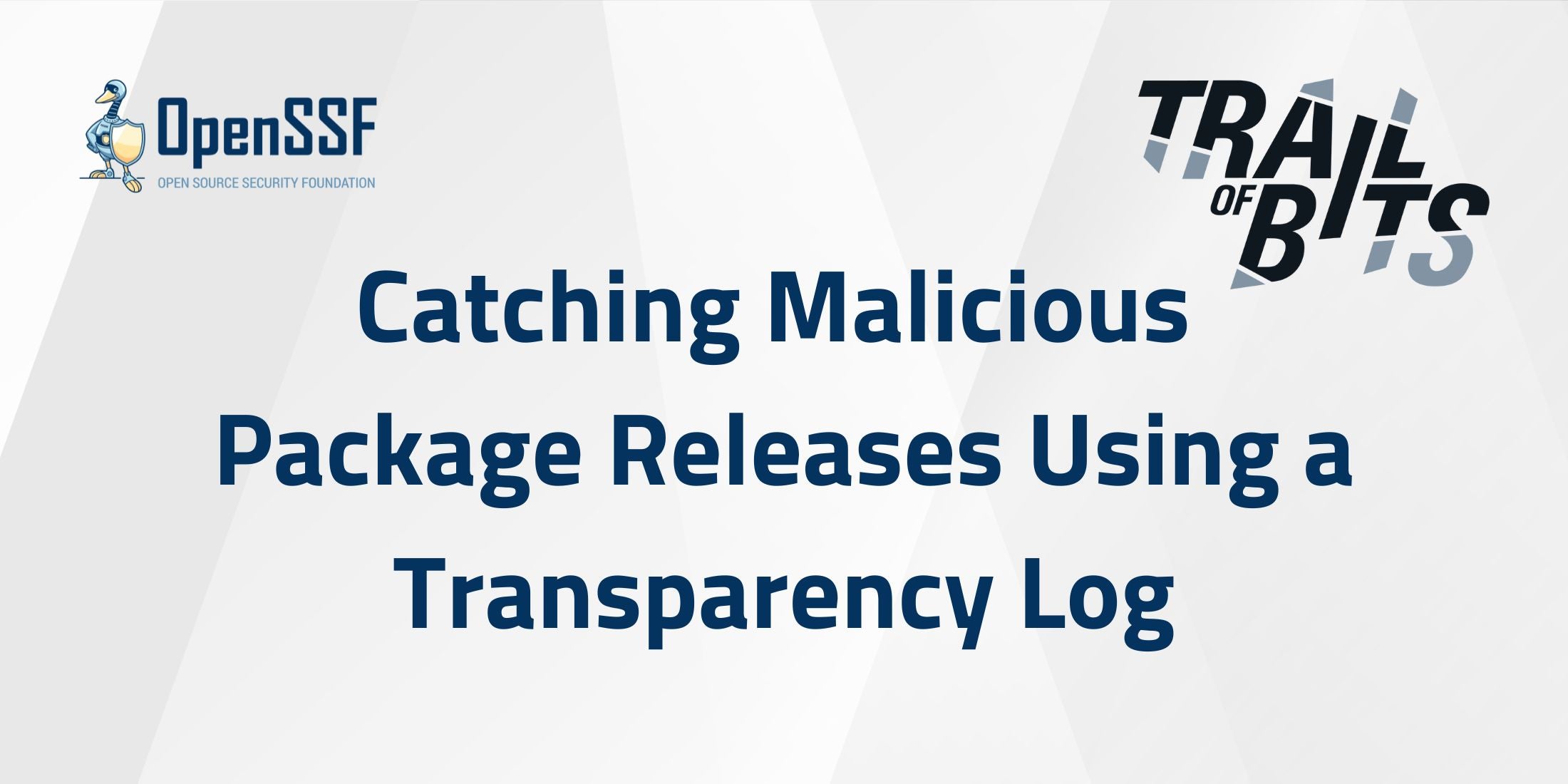
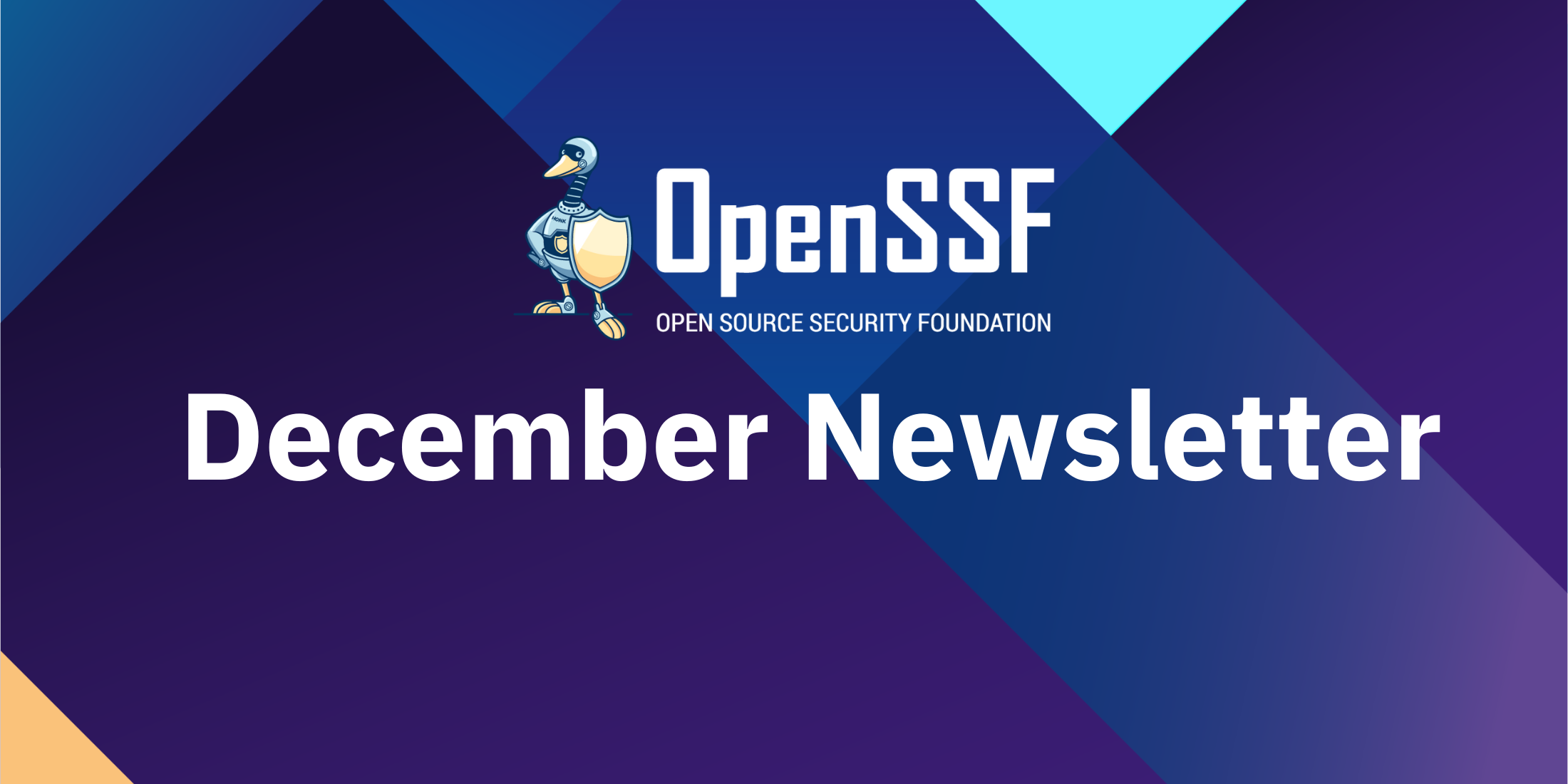
Welcome to the December 2025 edition of the OpenSSF Newsletter! Here’s a roundup of the latest developments, key events, and upcoming opportunities in the Open Source Security community.
🎁 2025 OpenSSF Annual Report
🎁 Free OpenSSF and Linux Foundation Education Courses
☃️ Recap: OpenSSF Community Day Korea 2025
☃️ KubeCon Keynote Recap
☃️ OpenSSF at OSPOlogyLive Europe
☃️ New podcast episodes (#46–47): AI, open source & collaboration (Jay White, Microsoft) and supply chain security in academia (Justin Cappos, NYU)
❄️ Alpha-Omega strengthened SBOM tooling and FreeBSD security
❄️ Gemara site launched
❄️ SecurityCon NA session videos now online
❄️ SLSA v1.2 adds a new Source Track
❄️ OpenBao v2.4.4 released
❄️ Upcoming events: FOSDEM (31 Jan & 1 Feb 2026), Open Source SecurityCon (23 March 2026), KubeCon+CloudNativeCon Europe (23-26, March 2026)
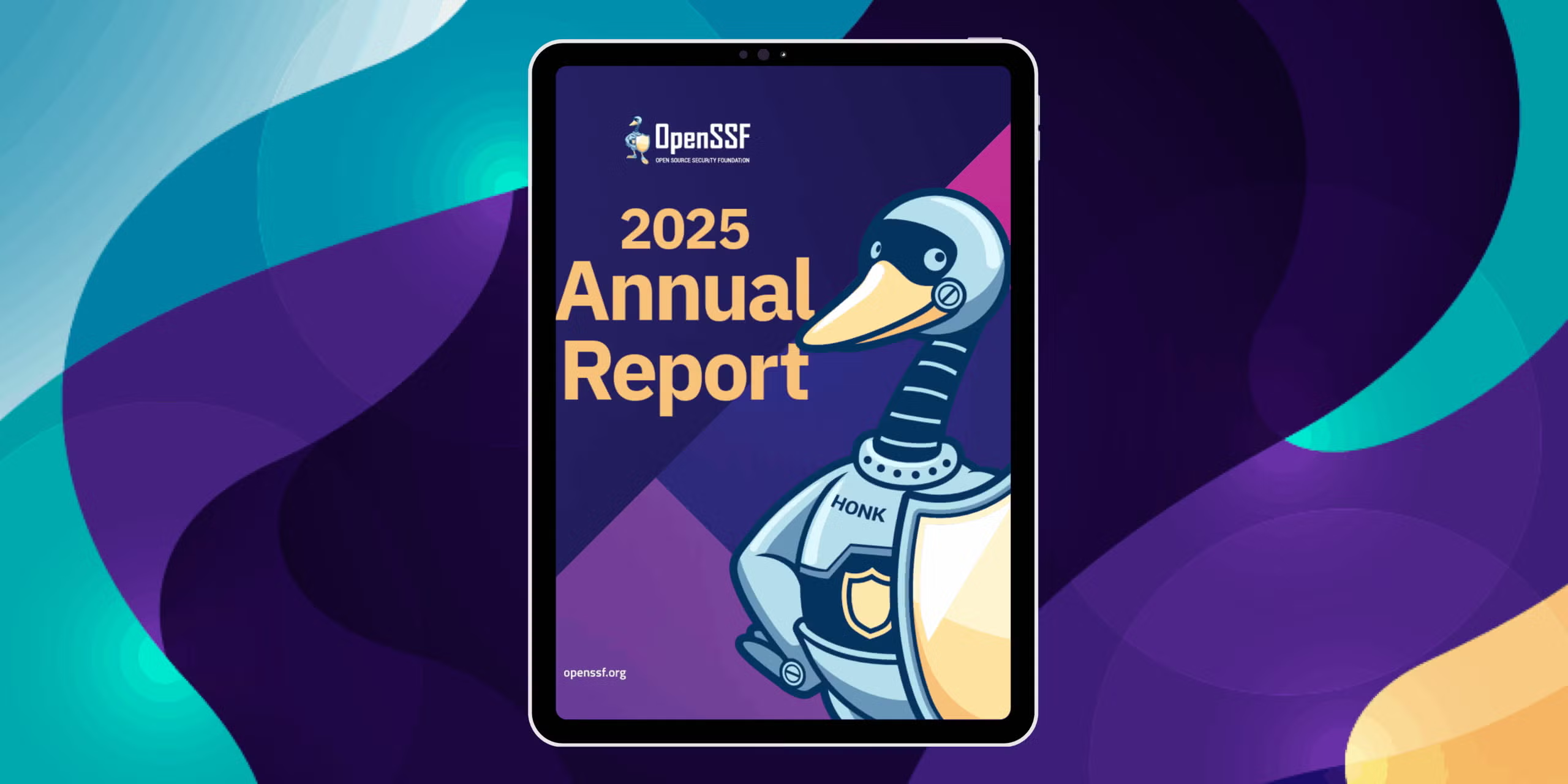
Discover how the open source security community moved forward in 2025. The OpenSSF Annual Report highlights major achievements in education, tooling, vulnerability management, research, and global collaboration with insights from leadership and working groups. It’s a powerful look at how far we’ve come and where we’re headed as we work together to strengthen the security of open source software.
Download the 2025 OpenSSF Annual Report and explore the progress, impact, and vision shaping the future of open source security.
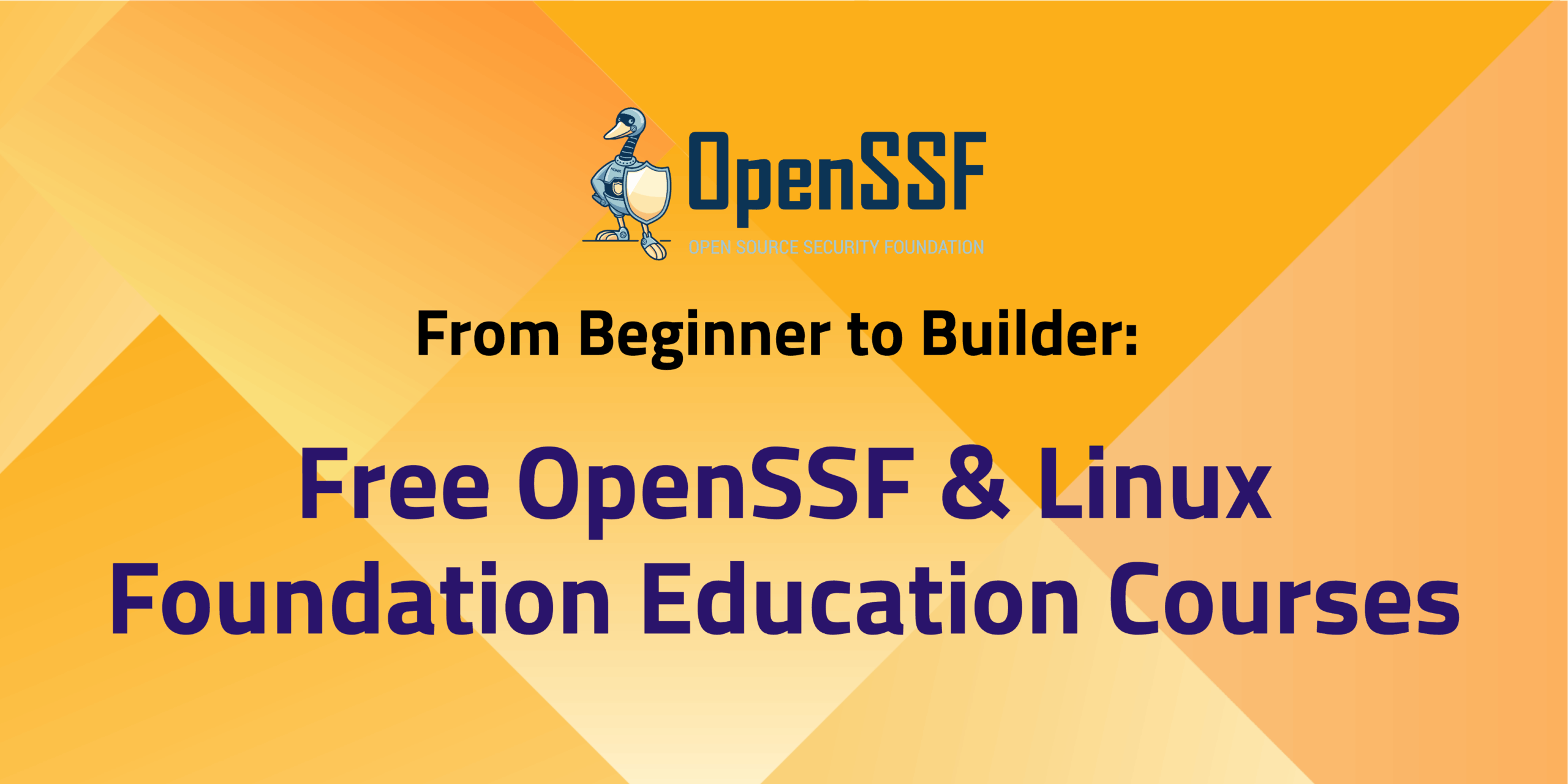
Level up your open source security skills with this practical roundup from Ejiro Oghenekome and Sal Kimmich, CSM, a curated list of free, self-paced Linux Foundation Education and OpenSSF courses built for developers who want to contribute with confidence. From secure coding and threat modeling to OpenSSF Scorecard automation, SBOMs/signatures, and even essential context like ethics, inclusion, and new regulations, this blog post maps out clear learning paths you can start right away, before (or alongside) your next contribution. Read the blog.
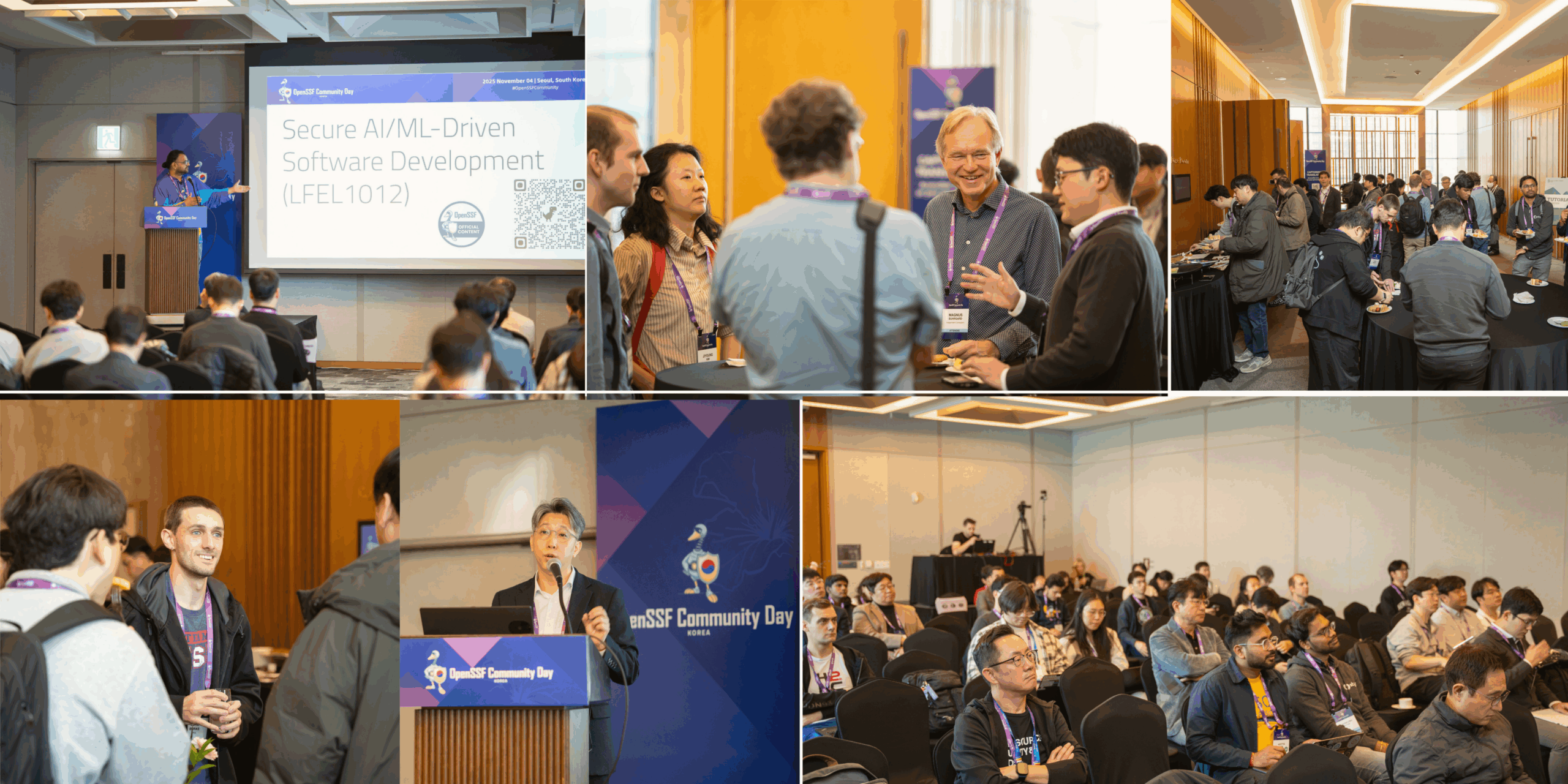
OpenSSF Community Day Korea 2025, held on November 4 in Seoul, brought developers and security engineers together for practical sessions on open source and software supply chain security. Talks spanned CI/CD hardening, SBOM-driven tooling, Linux kernel testing, post-quantum cryptography, and AI/ML security, all framed by OpenSSF’s pillars of Education, Policy, Projects, and Community. The event marked a strong start for a growing OpenSSF community in Korea, with public, private, and academic stakeholders aligning around the message that securing open source is shared work. Read the recap blog.
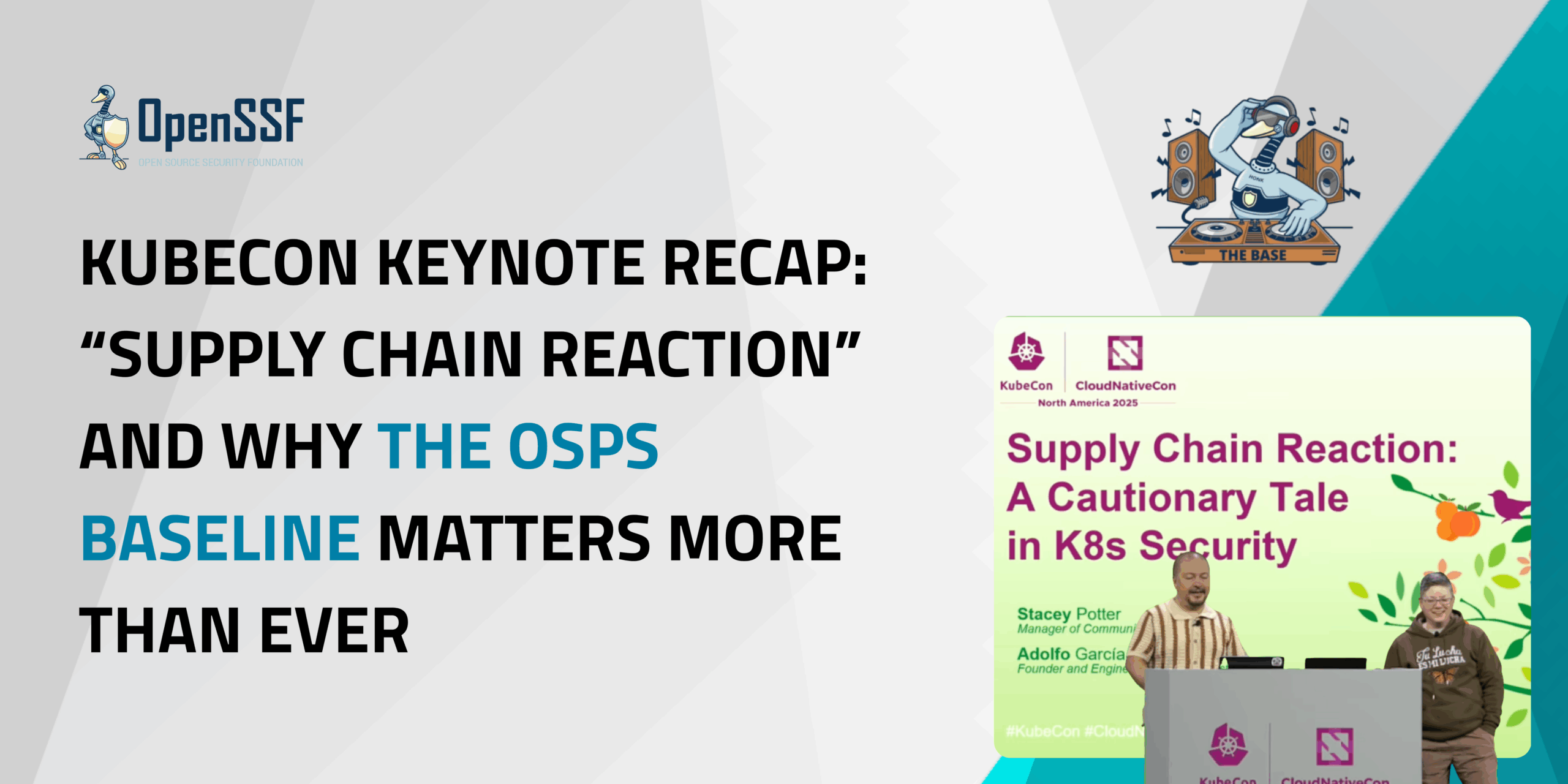
How can a Kubernetes cluster with zero known vulnerabilities still be compromised?
In their KubeCon keynote “Supply Chain Reaction: A Cautionary Tale in K8s Security,” Stacey Potter (Community Manager, OpenSSF) and Adolfo García Veytia (Founder and Engineer, Carabiner Systems) walked through a realistic incident where a compromised compiler image injected a crypto-mining payload long before workloads reached the cluster, bypassing traditional defenses. They showed how tools like SLSA, Sigstore, Kyverno, and Ampel help secure the entire software lifecycle, and why the new Open Source Project Security (OSPS) Baseline with its eight control families and three maturity levels gives projects a practical, stepwise framework to resist invisible supply-chain attacks.
The talk makes a clear case: adopting the OSPS Baseline is now essential for any open source project that wants real, preventative supply-chain security. Learn more.
Short on time but curious about open source security tools? This video series features quick interviews with OpenSSF maintainers, giving you a fast, developer-focused look at the projects, standards, and initiatives they’re building. Hear directly from the people behind the code and discover which tools you might want to try next. Watch the videos here.
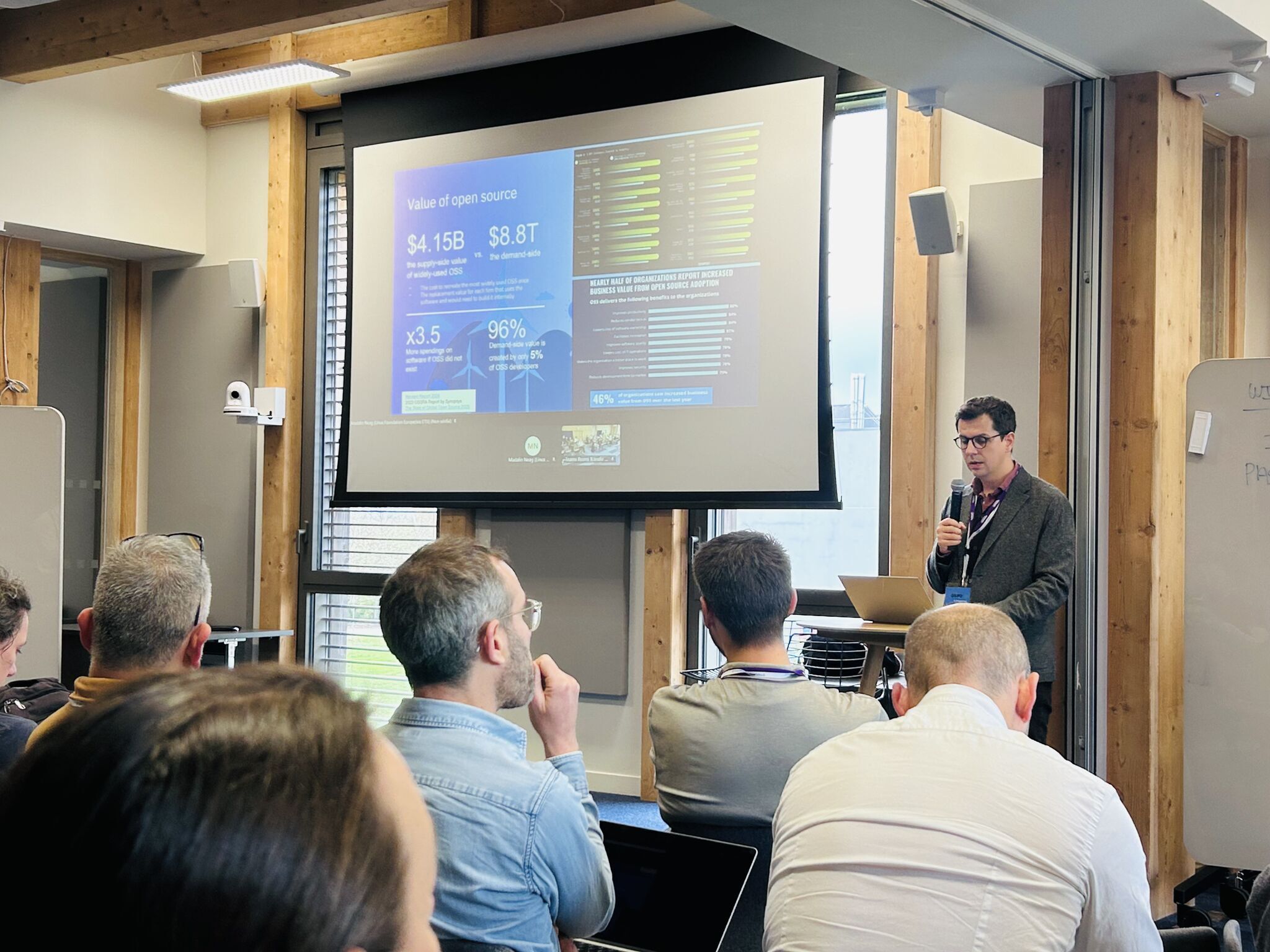
Madalin Neag, EU Policy Advisor at OpenSSF participated in OSPOlogyLive Europe, where he presented The Cybersecurity Skills Framework presentation and discussed why securing software requires investing in people and shared security knowledge, not just technology. The session highlighted OpenSSF’s leadership in building practical, role-based security capabilities across engineering teams. The framework provides a clear, actionable map for identifying security skill gaps and prioritizing capability development across the software ecosystem. It also demonstrated how organizations can use a common language for security skills to systematically improve their cybersecurity posture.”
#47 – S2E24 Teaching the Next Generation: Software Supply Chain Security in Academia with Justin Cappos
On the latest episode of What’s in the SOSS, host Yesenia Yser sits down with Justin Cappos, professor at NYU Tandon School of Engineering, to discuss why software supply chain security is still missing from many university curricula and how hands on, open source first education can better prepare students for real world security work.
The conversation explores gaps in traditional computer science education, the importance of teaching open source collaboration, and how initiatives like the Linux Foundation’s Academic Computing Accreditation Program are helping institutions modernize security education.
🎧 Listen to the episode and learn more about the Academic Computing Accreditation Program: https://www.linuxfoundation.org/academic-computing-accreditation
#46 – S2E23 Securing the Future: AI, Open Source, and Collaboration with Jay White (Microsoft)
In this episode of What’s in the SOSS? Jay White from Microsoft’s Azure office of the CTO joins to talk about his path into open source and how it led him to focus on AI, machine learning, and security. He explains how model signing and transparency are becoming core to trustworthy AI, and shares ongoing work in OpenSSF and the Coalition for Secure AI (CoSAI) to build standards for AI supply chain security. The conversation touches on the challenges of cultural representation in AI models, why collaboration across companies and communities is essential, and how practitioners can get involved. Jay also reflects on the importance of community building and continuous learning as AI and open source evolve together.
Connect with the OpenSSF Community at these key events:
Ways to Participate:
There are a number of ways for individuals and organizations to participate in OpenSSF. Learn more here.
You’re invited to…
We want to get you the information you most want to see in your inbox. Missed our previous newsletters? Read here!
Have ideas or suggestions for next month’s newsletter about the OpenSSF? Let us know at marketing@openssf.org, and see you next month!
Regards,
The OpenSSF Team

